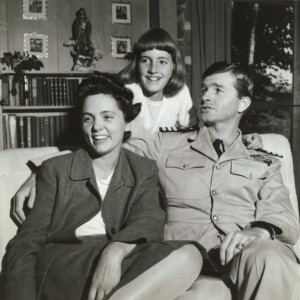 On Tuesday, NEHGS announced the first fruits of an historic collaboration with the Archdiocese of Boston, one where – over a period of years – Archdiocesan records will be digitized and made available on the NEHGS website, AmericanAncestors.org. In the fullness of time, this collaboration will preserve and make accessible unique records to tell the stories of some 10 million people from the earliest days of the Catholic community in Massachusetts through the twentieth century. These records are key because they often include events not captured in civil registrations. Whether because of a home birth or a conscious decision not to report an event to a civil authority, these documents might include the only written record for a birth or a death. Their importance and value cannot be overstated. Continue reading An historic collaboration
On Tuesday, NEHGS announced the first fruits of an historic collaboration with the Archdiocese of Boston, one where – over a period of years – Archdiocesan records will be digitized and made available on the NEHGS website, AmericanAncestors.org. In the fullness of time, this collaboration will preserve and make accessible unique records to tell the stories of some 10 million people from the earliest days of the Catholic community in Massachusetts through the twentieth century. These records are key because they often include events not captured in civil registrations. Whether because of a home birth or a conscious decision not to report an event to a civil authority, these documents might include the only written record for a birth or a death. Their importance and value cannot be overstated. Continue reading An historic collaboration
Tag Archives: Research tips
A belated Christmas gift
 Some people are extraordinarily difficult to shop for. My parents fall into that category. They’ve collected several things over the years, so even thinking of something they would like is a challenge. My father is also the sort of person who goes out and buys whatever he thinks he needs within a week or two of thinking of it, which leaves me, and my sisters, struggling for gift ideas at the holidays. This year, instead of buying my parents something they’d neither want nor need, I decided to make them family trees. I have a family tree on RootsMagic that I’ve been working on for the last few years, and I thought they might like to have the information I’ve collected. Continue reading A belated Christmas gift
Some people are extraordinarily difficult to shop for. My parents fall into that category. They’ve collected several things over the years, so even thinking of something they would like is a challenge. My father is also the sort of person who goes out and buys whatever he thinks he needs within a week or two of thinking of it, which leaves me, and my sisters, struggling for gift ideas at the holidays. This year, instead of buying my parents something they’d neither want nor need, I decided to make them family trees. I have a family tree on RootsMagic that I’ve been working on for the last few years, and I thought they might like to have the information I’ve collected. Continue reading A belated Christmas gift
2016: the year in review concluded
At the beginning of 2017, Vita Brevis can boast 1,177,549 page views: while individual readers have surely read multiple articles on a given visit, that million+ reader count is still impressive!
 Vita Brevis reached its one-millionth page view on 7 July, some two-and-a-half years after the blog’s launch on 10 January 2014:
Vita Brevis reached its one-millionth page view on 7 July, some two-and-a-half years after the blog’s launch on 10 January 2014:
“And what do [its contributing authors] write about?
“We write about what interests us, as researchers, as professional genealogists, as editors, as archivists. Sometimes the topic is our own research interests; sometimes we offer tips from our experience as a beginning, an intermediate, or an expert researcher; and sometimes we describe an aspect of our work, here in Boston or elsewhere as part of an NEHGS education program. Continue reading 2016: the year in review concluded
2016: the year in review
Each December I gather up a dozen blog posts from the year just ending, in hopes of giving new (and long-time) readers a sense of the breadth of content Vita Brevis offers.
 On 13 January, Zachary Garceau published a post on the 1906 San Francisco earthquake, marking the death of the last known survivor, William A. “Bill” Del Monte (1906–2016):
On 13 January, Zachary Garceau published a post on the 1906 San Francisco earthquake, marking the death of the last known survivor, William A. “Bill” Del Monte (1906–2016):
“In addition to the tragic loss of human life, the effects of another significant loss have been felt in the 110 years since that disastrous day. As a result of ruptured gas mains and other structural issues, several massive fires erupted, including one which swept through the San Francisco City Hall and its adjoining Hall of Records. Continue reading 2016: the year in review
Québec newspapers
 Researching in Québec has many advantages: church records, census records, and notarial records are all at one’s disposal. But as with any kind of research, we can inevitably hit a brick wall. At this juncture, newspapers may offer some clues. Continue reading Québec newspapers
Researching in Québec has many advantages: church records, census records, and notarial records are all at one’s disposal. But as with any kind of research, we can inevitably hit a brick wall. At this juncture, newspapers may offer some clues. Continue reading Québec newspapers
Fireside chats, 2016
 This year’s holiday Open House at the NEHGS library on Saturday, December 10, included several Fireside Chats. In the morning Marie Daly and Judy Lucey discussed Irish genealogy.
This year’s holiday Open House at the NEHGS library on Saturday, December 10, included several Fireside Chats. In the morning Marie Daly and Judy Lucey discussed Irish genealogy.
In the afternoon Chris Child covered the different types of DNA testing – Y-chromosome, mitochondrial, and autosomal. This last is the “hot” fad right now; it’s the type you see on TV, such as “I thought all my ancestors were [fill in the blank], but…” I am no expert on the complexity of DNA inheritance, so it was interesting to learn that European (including the British Isles) DNA is greatly affected by thousands of years of migrating groups that have mixed up the pool to the point of making specific interpretations difficult. On the other hand, test results are accumulating to the point where surnames will be identifiable! Continue reading Fireside chats, 2016
Czech surnames
 While working on a research problem in preparation for a consultation, I wanted to determine how common the surname Kucera was in the Czech Republic. A name that seems fairly unusual here in the United States is often as common as Smith back in the old country. I found a web site, Czech Surnames, that gave a great deal of information about the origins of different Czech surnames, but also had a listing of the top 20 most popular surnames in the country for the years 1937, 1964, and 1996. I discovered that Kucera, which means “curly,” was and is the ninth most common surname in the country. For the research problem in the consultation this was not necessarily good news, but it substantiated the above premise. Continue reading Czech surnames
While working on a research problem in preparation for a consultation, I wanted to determine how common the surname Kucera was in the Czech Republic. A name that seems fairly unusual here in the United States is often as common as Smith back in the old country. I found a web site, Czech Surnames, that gave a great deal of information about the origins of different Czech surnames, but also had a listing of the top 20 most popular surnames in the country for the years 1937, 1964, and 1996. I discovered that Kucera, which means “curly,” was and is the ninth most common surname in the country. For the research problem in the consultation this was not necessarily good news, but it substantiated the above premise. Continue reading Czech surnames
Piece work
 I have developed a soft spot for two of my great-great-grandparents, Domenico Caldarelli and Maria Tavano. They were born in Italy, Domenico in Naples and Maria in Villa Santa Maria, Chieti. They emigrated to New York with their four children around 1890.
I have developed a soft spot for two of my great-great-grandparents, Domenico Caldarelli and Maria Tavano. They were born in Italy, Domenico in Naples and Maria in Villa Santa Maria, Chieti. They emigrated to New York with their four children around 1890.
I had my first glimpse of Domenico in New York in the 1900 Federal Census, when he was listed as a prisoner in Sing Sing. Was this my Domenico? The prisoner was older than I thought Domenico should be. Why was he in Sing Sing? What happened to his family? Continue reading Piece work
The Winthrop Papers
 A new database on AmericanAncestors that you might not think to look at is Gov. John Winthrop Papers, Vol. 1–5, 1557 to 1649. These five volumes were originally published by the Massachusetts Historical Society between 1929 and 1947. (The sixth volume, published in 1992, is still under copyright restrictions.) This collection is different from that known as the “Winthrop Journal,” published in 1853, although that also includes some correspondence.[1] Winthrop Papers contains correspondence of members of the extended Winthrop family, including the governor’s father, Adam Winthrop, and his son John Winthrop, the Younger. Continue reading The Winthrop Papers
A new database on AmericanAncestors that you might not think to look at is Gov. John Winthrop Papers, Vol. 1–5, 1557 to 1649. These five volumes were originally published by the Massachusetts Historical Society between 1929 and 1947. (The sixth volume, published in 1992, is still under copyright restrictions.) This collection is different from that known as the “Winthrop Journal,” published in 1853, although that also includes some correspondence.[1] Winthrop Papers contains correspondence of members of the extended Winthrop family, including the governor’s father, Adam Winthrop, and his son John Winthrop, the Younger. Continue reading The Winthrop Papers
Lucky clues

On the face of it, my mother’s immediate family was Southern: her father was born in Norfolk, Virginia, and her mother in Baltimore, Maryland. Things quickly get complicated, though, as my grandfather’s mother and my grandmother’s father were both born in Ohio; it was their spouses’ respective families who had the Virginia and Maryland connections. A generation further back, and my great-great-grandfather William Boucher Jr. (1822–1899) is my most recent immigrant forebear, arriving from Mannheim in the Grand Duchy of Baden in 1845. It will not be surprising, perhaps, that some other nineteenth-century ancestors hailed from elsewhere in the United States, or that both of my maternal grandparents had a lot of New England ancestry. Continue reading Lucky clues